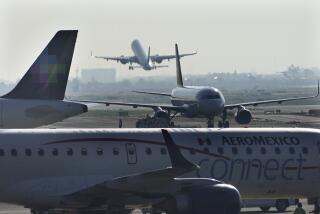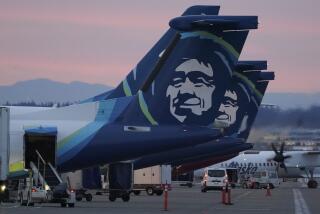Illinois air traffic site worker charged after fire disrupts flights
A suburban Chicago man who worked at the busy region’s air traffic control center posted to Facebook early Friday morning before setting a fire that disrupted travel across the country and then trying to slit his own throat, according to court documents.
Brian Howard of Naperville, Ill., a 36-year-old telecommunications worker who was employed at the center, was charged with a federal count of willfully setting fire to, damaging, destroying or disabling an air navigation facility, the criminal complaint said.
The air traffic control center, in Aurora, Ill., about 40 miles from downtown Chicago, oversees flights throughout the Midwest. The early morning fire quickly began to affect air schedules across much of the country.
More than 1,800 flights from O’Hare and Midway airports were canceled by the afternoon, and hundreds more flights at other airports from New York to Los Angeles, from Miami to the Northwest, were delayed or eliminated.
Passengers who were in the air thinking they would land in Chicago found themselves diverted, while many travelers were stuck in airports because their planes were grounded elsewhere.
According to an affidavit filed by FBI Special Agent Frank Jack Sodetz III, Howard had worked in the basement of the control center for the last eight years and was recently told he was being transferred to Hawaii.
Howard can be seen on surveillance video letting himself into the control center with his card key in the early morning darkness Friday, Sodetz said. He was pulling a black, hard-sided suitcase that apparently contained gas cans, knives and towels, the agent said.
Half an hour after Howard is alleged to have entered the center -- which is known by the three-letter designation ZAU -- a message was posted to Facebook under the name Howard that amounted to a suicide note.
“Take a hard look in the mirror, I have,” the note said, according to Sodetz’s affidavit. “And this is why I am about to take out ZAU and my life. April, Pop, love you guys, and I am sorry. Leaving you with a big mess. Do your best to move on quickly from me please… So I’m gonna smoke this blunt and move on, take care everyone.”
Six minutes later, a 911 call came from the control center. The building was on fire.
Two paramedics, who Sodetz later interviewed, arrived shortly after the call. Smoke was hovering near the ground, Sodetz said, and they followed it. Then they saw blood on the basement floor.
As they walked along the trail of blood, they saw a panel that had been pulled away, exposing a welter of cables. Nearby was a gas can, its nozzle, burned towels and a black suitcase.
They continued walking, Sodetz said in the affidavit, and came upon a knife. And a lighter. Another knife. More blood.
“Paramedic A then saw a pair of feet sticking out from under a table,” the affidavit said. “Paramedic A found a white male, later identified as HOWARD, without a shirt. HOWARD was in the process of actively slicing his own throat with another knife. Paramedic A also saw cut wounds on HOWARD’s arms.”
The emergency workers pulled the knife from Howard’s hand.
“Leave me alone,” the injured suspect said.
Aurora Police Chief Gregory S. Thomas told reporters at a televised news conference that the blaze was extinguished within minutes. Howard was taken to a hospital, the chief said, where he was listed in stable condition and was expected to recover.
Officials were still searching for a motive but ruled out terrorism, after initially blaming an employment dispute involving a contractor.
A 50-year-old man was treated at the scene for smoke inhalation, authorities said.
As Howard was trying to kill himself in the air traffic control center, Eric Stern was just waking up in a cot room at Chicago’s Midway International Airport.
The performance artist and opera singer was en route to his Portland, Ore., home after a trip to Philadelphia. What should have been an easy stopover in Chicago turned into a nightmare, disrupted first by terrible weather and then by the fire at the air traffic control center.
“I have bad luck,” he said at Midway. “I came from Philadelphia last night. That flight was delayed three hours because of weather. When I got here, my flight to Portland was already gone. They have cots here. I decided to stay on a cot.
“My flight was supposed to be this morning at 8:30,” Stern continued. “They texted me and said it was delayed. Then, like other people, I checked the board and it said ‘canceled.’
“I have seen a number of people come in, look kind of stunned at the departure screen because everything says ‘canceled.’ The next thing they do is lift up their iPhones and take a picture,” Stern said.
Hours after the fire, it still was unclear when the airports would return to full operation. The Federal Aviation Administration said that “flights are currently arriving and departing in the Chicago area at a reduced rate.”
In Chicago, Southwest Airlines announced it had canceled all flights at Midway and Milwaukee’s General Mitchell International Airport through at least 7 p.m. CDT.
Even as officials were working to bring the Chicago situation under control, ripple effects were felt across the nation.
Nearly 300 Delta Air Lines and Delta Connection flights were canceled nationwide as of 5 p.m. EDT, said Delta spokesman Morgan Durrant. At least nine flights to the Chicago area from Los Angeles had been canceled -- six to O’Hare and three to Midway. There were also early signs of trouble in Portland, where nine other flights were canceled, about three times the usual number.
At least 22 cancellations of United, American, Delta and Southwest flights were reported at New York-area airports, and Phoenix’s Sky Harbor International Airport reported that about 20 flights to and from Chicago were canceled.
Still, not every airport was feeling the pain.
“We don’t have any major impact,” said Perry Cooper, a spokesman for Seattle-Tacoma International Airport. “There is not necessarily a ton of aircraft coming in and out from Chicago. But we do expect to see some domino effect.”
Also reporting a minimal effect was Denver International Airport, said Laura Coale, media relations director for the facility.
“We have approximately 1,600 flights a day on average. We’re seeing about dozen cancellations. Southwest has canceled about 11. United has canceled two — in and out of Milwaukee. It’s really minimal,” she said.
maria.laganga@latimes.commichael.muskal@latimes.com
La Ganga reported from Seattle and Muskal from Los Angeles. Times staff writers Alana Semuels in New York, Cindy Carcamo in Arizona, David Zucchino in North Carolina, John Glionna in Las Vegas, Christine Mai-Duc in Los Angeles and Molly Hennessy-Fiske in Houston contributed to this report.
More to Read
Start your day right
Sign up for Essential California for news, features and recommendations from the L.A. Times and beyond in your inbox six days a week.
You may occasionally receive promotional content from the Los Angeles Times.







